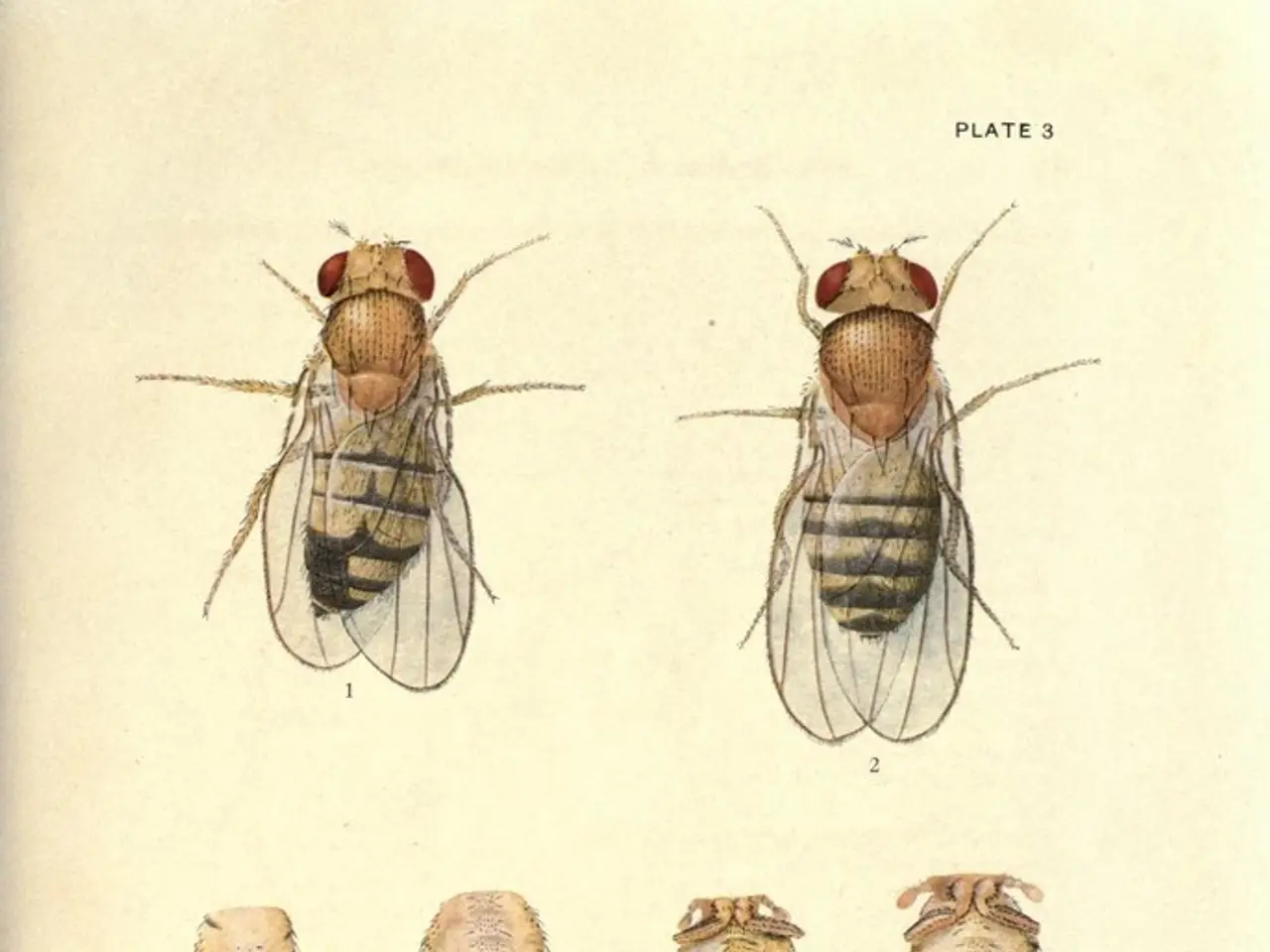Symptoms and Concerns Surrounding Insecticide Allergies Triggered by Wasp Stings
In a significant breakthrough for those suffering from insect venom allergies, a well-established treatment known as specific immunotherapy (VIT) or desensitisation is proving to be highly effective. This treatment, which involves gradually increasing doses of insect venom via injections over a period of typically three to five years, aims to reduce the immune system's allergic response to future stings.
The treatment, which can be administered for venoms from bees or wasps, has shown impressive results in reducing the risk of severe, life-threatening systemic allergic reactions. According to reports, protection against severe allergic reactions is approximately 77-84% for honeybee stings and 91-96% for wasp (vespid) stings. Overall effectiveness is cited around 85-95% when the full course of treatment is completed.
The treatment protocol typically begins with a buildup phase, where increasing doses are injected weekly for 8-10 weeks until a maintenance dose is reached, followed by maintenance injections every 8-10 weeks for about three years.
Beyond reducing the frequency and severity of allergic reactions, VIT also improves patients' psychological quality of life by alleviating the fear of future sting reactions.
VIT is primarily recommended for those with severe systemic allergic reactions who remain at high risk for future stings. Patients allergic to multiple venoms, such as both honeybee and wasp, may require treatment targeting both venoms.
It's important to note that there is no definitive biomarker to determine when VIT can safely be discontinued, so lifelong therapy might be considered in selected high-risk cases, especially in honeybee venom allergy or if systemic reactions occur during treatment.
For those who suspect an insect venom allergy, seeking a medical diagnosis is crucial. Once diagnosed, insect venom allergy sufferers are typically prescribed an emergency kit containing cortisone, antihistamine, and an adrenaline auto-injector.
To minimize the risk of stings, it's advisable to avoid walking barefoot or with open shoes over the meadow, not have breakfast outside in the summer, and not use perfumed cosmetics. When a wasp comes dangerously close, staying calm and not waving arms around is recommended. Securing drinks (covering bottles and glasses and drinking through a straw) can also help prevent stings.
A blood test and a skin test are usually used for diagnosis. Adrenaline should be applied as soon as possible after a sting, as it is not predictable if an allergic shock may develop. The emergency kit should always be carried, even for short garden visits.
The likelihood of specific immunotherapy improving the condition is good, offering a 98% safety guarantee against developing life-threatening reactions in the future. After consistent follow-up for about three years, the emergency kit is no longer needed if there are no additional risk factors for severe reactions.
In conclusion, specific immunotherapy for insect venom allergies is a well-established, effective, and potentially long-lasting treatment that substantially reduces the risk of life-threatening allergic reactions from future insect stings. Completion of the recommended treatment course is critical to achieving optimal protection.
- Science has made significant strides in managing medical-conditions, such as chronic-diseases and chronic-kidney-disease, type-2-diabetes, cancer, respiratory-conditions, and digestive-health concerns.
- In the field of eye-health, advancements in therapies-and-treatments have led to improvements in correcting vision issues and preserving eye sight.
- Hearing loss and related conditions can be addressed with a variety of treatments and interventions, including surgery and hearing aids.
- With more focus on health-and-wellness, fitness-and-exercise, sexual-health, family-health, and mental-health, people are adopting healthier lifestyles and seeking better care for themselves and their loved ones.
- Mens-health initiatives emphasize the importance of prostate health, testicular cancer screening, and addressing various male-specific health issues.
- Skin-care products and treatments have come a long way in managing skin-conditions, whether it's addressing acne, eczema, or psoriasis.
- When it comes to seniors' health, medicare provides essential coverage for many health-related needs, including coverage for therapies-and-treatments for diseases like Alzheimers-disease, autoimmune-disorders, and neurological-disorders.
- In response to growing awareness around mental-health, more resources and support systems are being made available for individuals struggling with various mental-health issues, such as depression and anxiety.
- Womens-health encompasses a wide range of topics, from gynecological services to breast-cancer screenings, as well as menopause management and sexual health education.
- With the rise in parenting resources and support networks, families can better address the unique challenges of their child's health, including developmental disorders and common childhood ailments.
- Multiple-sclerosis research is ongoing in the quest for better treatments and a potential cure, while support groups offer comfort and understanding for those affected by the disease.
- Migraine sufferers now have access to more targeted and effective treatments, aimed at reducing frequency and severity of attacks and improving overall quality of life.
- Cardiovascular-health is a priority area, with emphasis on diet, exercise, and regular screenings to address conditions like hypertension and high cholesterol.
- As people become more informed about the importance of personal health, they are seeking out resources for various health-related topics, from general wellness tips to in-depth information about specific conditions and treatments.
- Health-conscious individuals are investing in various therapies-and-treatments, such as acupuncture, massage, and meditation, to maintain and enhance their overall well-being.
- In a continued effort to promote health and wellness, various organizations and advocacy groups are working to raise awareness, fund research, and provide support for under-served populations and lesser-known conditions, like rheumatoid-arthritis and lesser-known neurological-disorders.




